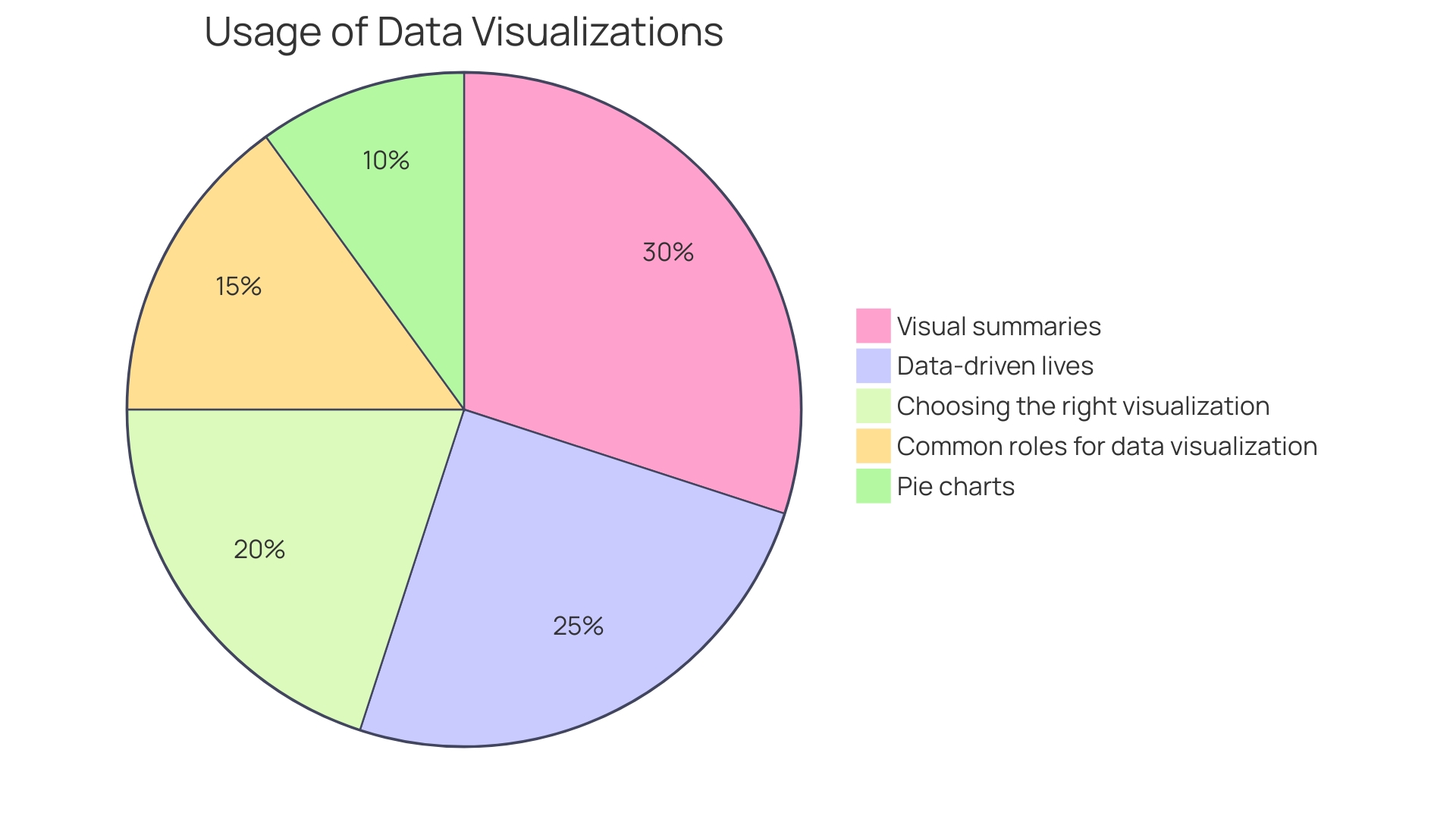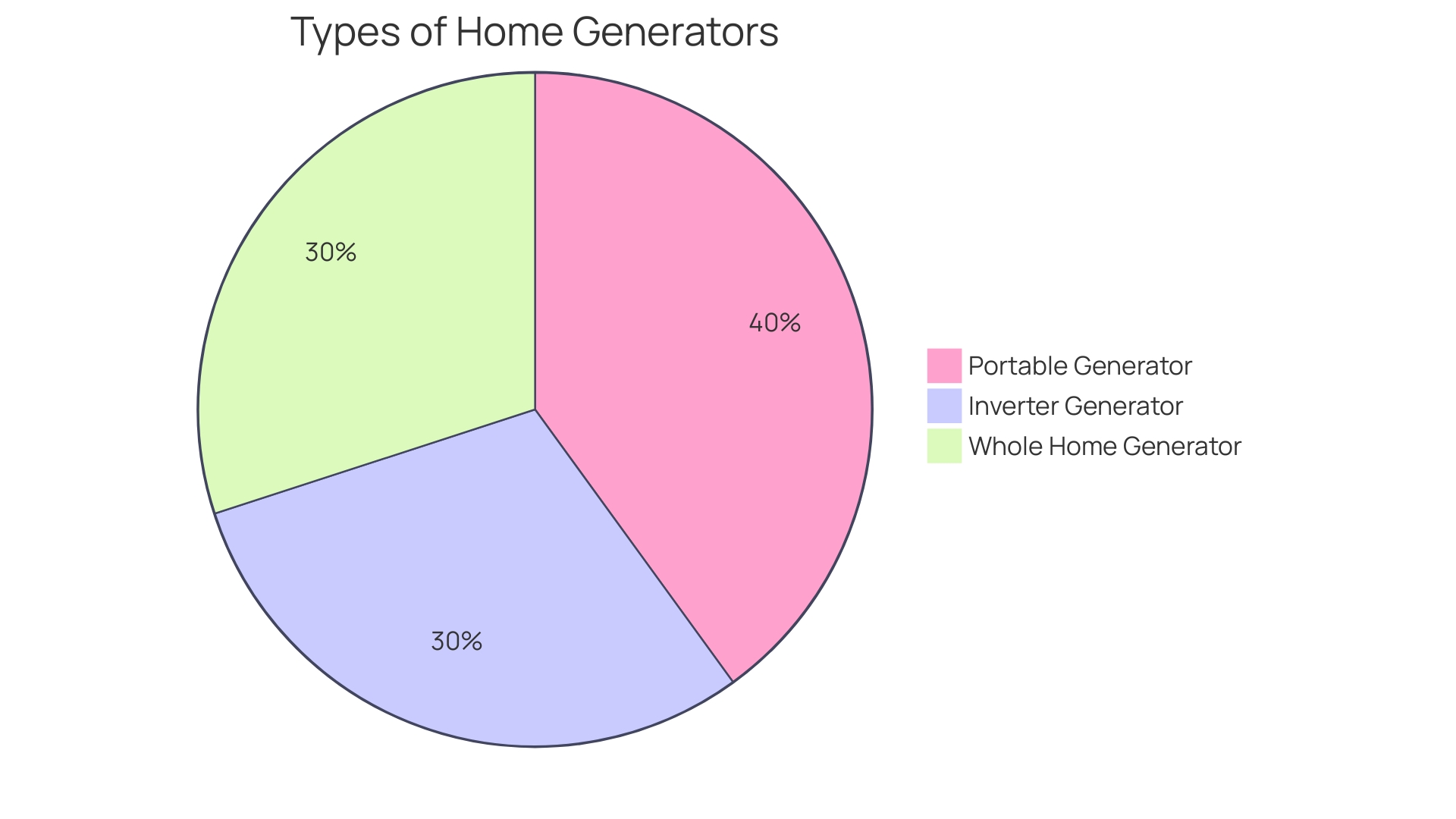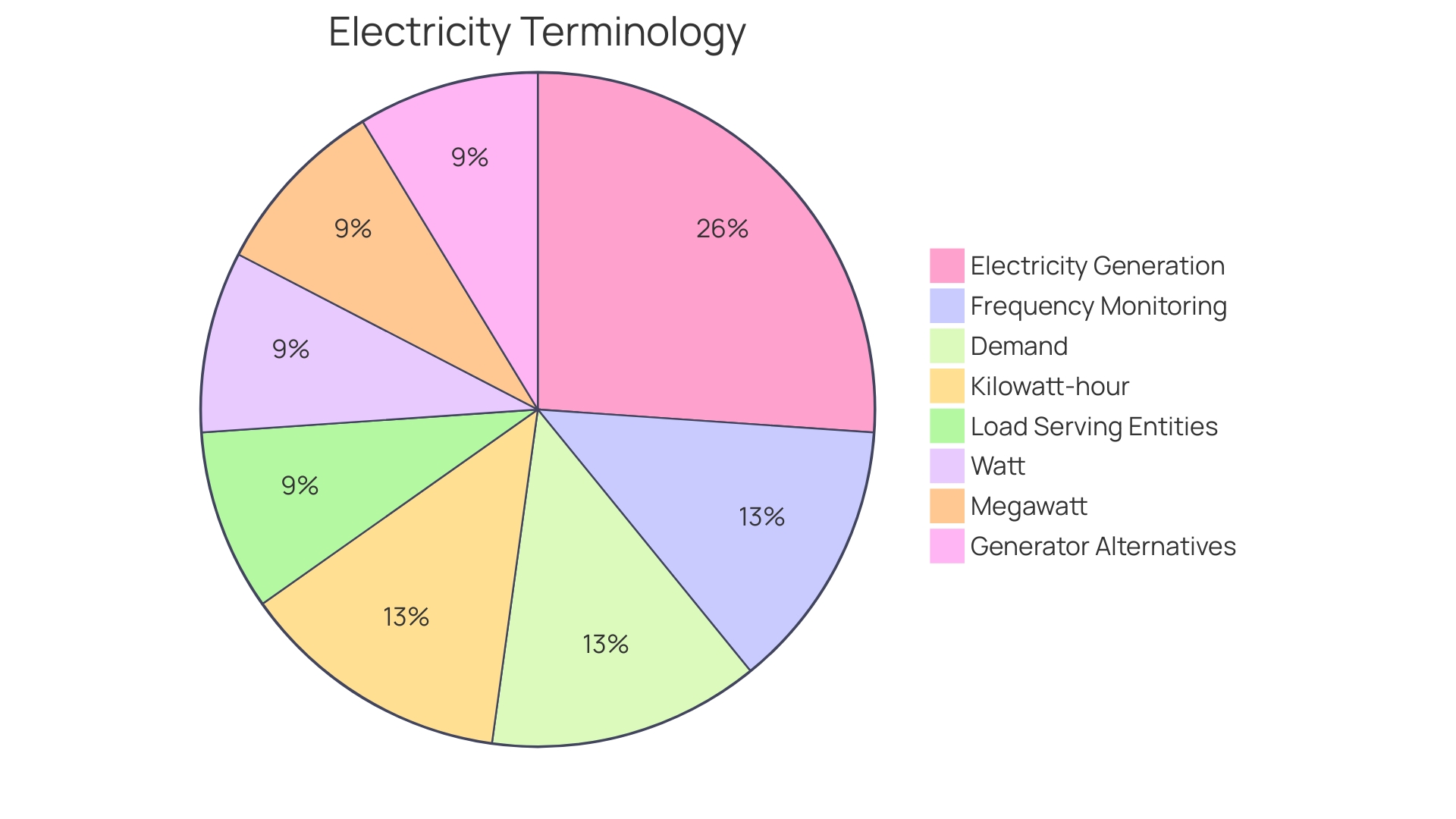Introduction
Optimizing generator size is a critical decision for ensuring seamless operation and cost-effectiveness. A generator that's too small can lead to power shortages, causing work interruptions, while an oversized generator will unnecessarily inflate your expenses. Portable generators, with their ability to power a wide range of tasks, from charging small electronics to running heavy machinery, offer a solution tailored to the specific needs.
The key is to consider your power requirements, typically measured in kilowatts (kW), alongside the generator type—be it gasoline-powered models or the more eco-friendly solar backups. With portable generators available in various sizes and the growing importance of a reliable power source due to an aging electric grid, selecting the right generator means balancing power needs with operational costs. This ensures uninterrupted power supply and resource efficiency, a crucial aspect especially when extreme weather can lead to increased blackout risks.
By carefully assessing your power consumption and choosing a generator that matches your needs, you can maintain productivity without overspending.
Why Choosing the Right Size Generator is Crucial
Optimizing generator size is a critical decision for ensuring seamless operation and cost-effectiveness. A generator that's too small can lead to power shortages, causing work interruptions, while an oversized generator will unnecessarily inflate your expenses. Portable generators, with their ability to power a wide range of tasks, from charging small electronics to running heavy machinery, offer a solution tailored to the specific needs.
The key is to consider your power requirements, typically measured in kilowatts (kW), alongside the generator type—be it gasoline-powered models or the more eco-friendly solar backups. With portable generators available in various sizes and the growing importance of a reliable power source due to an aging electric grid, selecting the right generator means balancing power needs with operational costs. This ensures uninterrupted power supply and resource efficiency, a crucial aspect especially when extreme weather can lead to increased blackout risks.
By carefully assessing your power consumption and choosing a generator that matches your needs, you can maintain productivity without overspending.
Steps to Determine Your Power Needs
Assessing the precise power requirements before opting for a generator rental is critical. This involves evaluating the energy demands of all devices and machinery that will be connected to the generator. Factors such as the starting wattage, which can be significantly higher than the running wattage, are essential to consider, as they ensure the generator can cope with the initial surge in power needed when equipment is turned on.
Understanding the difference between starting and running wattage is key to selecting a generator that is neither underpowered nor unnecessarily large, which could lead to unwarranted expenses.
When deciding on the size of the generator, it's important to note that a standard American household consumes close to 900 kWh per month, translating to roughly 30 kWh daily. Generators with a capacity of 20 kW are typically used to power an entire home and are on the higher end of the cost spectrum. On the other hand, generators with less than 10 kW are designed for smaller tasks and are more affordable.
The type of generator also plays a pivotal role in determining the cost, with gasoline-powered generators being the most common and cost-effective option, while alternatives like solar battery backups offer stored electricity for later use but at a higher initial investment.
Moreover, the duration for which a generator can provide power is contingent on various factors. While the average U.S. household experiences about seven hours of electricity outages annually, unforeseen events can significantly extend this period, as demonstrated by the Texas winter storm in 2021 which resulted in outages lasting several days. Thus, selecting a generator with the right capacity and fuel efficiency is crucial for ensuring uninterrupted power during both routine operations and unexpected emergencies.
Taking into account these considerations will guide you in making an informed decision, leading to cost savings and reliable power supply for your project's duration.
Calculating Wattage Requirements
Selecting the appropriately sized generator is essential for ensuring consistent power supply to all your essential equipment. To determine the right generator for your needs, you must calculate the energy consumption of the devices you intend to power. Understanding the watt-hour (Wh) is fundamental in this process.
A watt-hour signifies the energy used when one watt of power is expended for one hour. For example, operating a 60W bulb for one hour uses 60Wh of energy.
When tallying your total wattage needs, include all appliances and their respective wattage ratings. A portable power station with a 500Wh capacity would be able to power a 100W device for five hours. Moreover, consider the energy requirements of a typical refrigerator, which, at a 150W rating, would consume 3,600Wh or 3.6kWh over 24 hours.
The type of generator you choose—be it a portable, inverter, or a whole home generator—will depend on these calculations, as well as your specific circumstances. Portable generators are a flexible and economical choice, often running on gasoline and designed for easy transportation. In contrast, home batteries, paired with solar panels, can provide a more sustainable backup power solution, allowing you to utilize solar energy even at night.
Ultimately, the balance between the electrical power consumed (P) and the energy supplied (E) must be maintained to prevent power disruptions. By meticulously calculating your wattage requirements, you can select a generator that will not only meet your power demands but also contribute to a stable energy balance within your home or business.
Types of Generators for Rental: Pros and Cons
Navigating the generator rental market requires a keen understanding of the options available and their respective benefits and limitations. Portable generators, which are typically gasoline-powered, offer the advantage of mobility and ease of transportation. Their affordability and various power output capacities make them ideal for a range of applications, from charging small devices to running substantial equipment.
Inverter generators, on the other hand, are a compact alternative that provides clean and stable power suitable for sensitive electronics. For those seeking a solution during extended power outages, such as the ones Texans faced during the 2021 winter storm, these generators can be an invaluable resource. On the flip side, the energy demands of your project might necessitate a whole-home generator, particularly in areas where the aging electric grid is susceptible to blackouts caused by extreme weather conditions.
These generators are generally more robust, offering around 20 kW of capacity, and are priced higher due to their comprehensive coverage. Fuel efficiency is another vital consideration, especially given the average American household's consumption of approximately 900 kWh per month. Diesel generators are lauded for their fuel efficiency and longevity, making them a cost-effective choice for long-term rental needs.
Whether your project requires a generator for a few hours or several days, the key to a cost-effective rental strategy is assessing the required power, typically measured in kilowatts, alongside the fuel source to find the right balance between budget and performance.
Benefits of Renting vs. Buying a Generator
Choosing to rent a generator presents a multitude of advantages, particularly for those who require temporary power solutions. With rental options, one can enjoy the perks of deploying cutting-edge technology and modern models without the financial burden of a full purchase. The practicality of renting is further underscored by the elimination of ongoing maintenance and storage costs, as these responsibilities fall to the rental provider.
Generators come in various forms, each suited to different scenarios and needs. Portable generators, valued for their ease of mobility, can be transferred effortlessly to various locations. These typically operate on gasoline, offering a cost-effective choice for on-the-go energy needs.
Conversely, inverter generators offer a compact, transportable alternative, delivering quiet and efficient power for smaller scale requirements.
In light of the U.S. Energy Information Administration's data, which states the average household encounters approximately seven hours of power outages annually, the flexibility of generator rentals becomes even more appealing. Notably, during extreme weather events, such as the 2021 Texas winter storm, the potential for prolonged blackouts increases. In these circumstances, having access to a rental generator can provide an invaluable contingency plan, ensuring continuity of power without the commitment and expense of ownership.
Moreover, as the electrical grid faces growing challenges from aging infrastructure and heightened weather events, the reliability of a rental generator can offer peace of mind. Whether it's for residential, recreational, or professional use, generator rentals provide a strategic solution, aligning with one's changing power demands while maintaining cost-efficiency.

Factors to Consider When Selecting a Generator Rental
When it comes to ensuring your project is not left in the dark, choosing the right generator rental can be as crucial as the equipment itself. To navigate the multitude of options available, it's essential to first determine the power demands of the tools and appliances you plan to operate. The endurance of the generator must also be considered—will it run as long as you need it to?
Portable generators, with their convenient wheels and smaller handheld models, offer flexibility and ease of transportation, ideal for a variety of situations. Meanwhile, inverter generators provide a more compact alternative, suitable for less demanding power needs.
Generators, especially in regions like North Texas—currently a hotspot for industrial development—must be selected with fuel efficiency in mind, to not only manage operational costs but also minimize environmental impact. Noise is another factor, particularly for residential areas or events where a loud generator could be disruptive. Amidst growing concerns about the aging electric grid and the potential for blackouts during extreme weather events, the reliability of your generator choice becomes even more pertinent.
The duration for which a generator can sustain your home or project can vary considerably, with average power outages lasting about seven hours annually, but extreme conditions can extend this significantly. Given the unpredictable nature of such events, as seen during Texas' winter storm in 2021, it's wise to select a generator that can support your needs for an extended period.
Finally, the credibility of the rental company is paramount to a stress-free experience. With the energy sector in places like Midland, Texas attracting a youthful workforce, the demand for reliable power sources is on the rise. Ensure that your rental company can deliver not just a generator, but also peace of mind with their service and support.
Importance of Extra Capacity in Generator Rentals
Opting for a generator with surplus capacity offers a reliable safeguard against unforeseen power surges and increased energy demands. This strategic choice is not only about ensuring uninterrupted operations today but also about accommodating potential future growth or the integration of additional machinery. For instance, The Sinclair Hotel in Fort Worth, Texas, renowned as the 'world's first all-digital hotel,' transitioned from traditional diesel generators to advanced energy-conserving technologies.
This shift underscores the importance of sustainable and scalable power solutions in modern infrastructure.
When considering a generator rental, it's vital to evaluate the property's energy requirements. Factors such as cost, system location, and operational energy needs are critical. With the average household experiencing about seven hours of electricity interruptions annually, as reported by the United States Energy Information Administration, and events like the 2021 Texas winter storm causing extended power outages, preparedness is key.
Generators today come in various forms, from gasoline-powered portable units to inverter generators that offer portability and fuel efficiency.
Additionally, the selection of a generator with adequate capacity is influenced by its power output, typically measured in kilowatts (kW). While the average American household uses approximately 30 kWh per day, generators with 20 kW or more are often recommended for whole-home coverage. Generators under 10 kW are better suited for lighter applications.
This information empowers businesses and individuals to make informed decisions about their backup power generation, ensuring resilience and continuity in the face of energy disruptions.
Fuel Costs and Efficiency Considerations
Choosing the right generator for your project in the Dallas-Fort Worth area requires a keen understanding of fuel efficiency and operational costs. Portable generators, revered for their adaptability, are essential in navigating the unpredictable occurrences of power outages. Given the average American household's consumption of approximately 30 kWh per day, selecting a generator that aligns with your energy needs is paramount.
Diesel generators stand out for their exceptional fuel efficiency and are ideal for extended rental periods, potentially offering lower operating expenses over time. Gasoline generators might entice with their lower initial cost, but their higher fuel consumption can inflate expenses. Propane options are appreciated for their clean combustion; however, the fuel costs can be steeper.
When the power grid falters, whether from severe weather or overuse during peak seasons, a well-chosen generator can be a saving grace. The right generator not only provides peace of mind but also ensures that you can maintain operations without incurring unnecessary costs. With energy demands surging, as seen during the Texas winter storm of 2021, the significance of reliable and cost-effective power solutions has never been more evident.
It's crucial to factor in both the wattage requirements and the fuel source when selecting a generator. Whether it's a portable generator that can be easily transported to different sites or an inverter generator that's smaller and more mobile, making an informed choice based on fuel expenses and efficiency will serve to optimize your equipment rental budget while meeting the requirements of your construction projects.

Maintenance and Support Services with Generator Rentals
When opting for a generator rental, it's essential to consider the full spectrum of maintenance and support services offered to maintain the unit's peak condition. A well-maintained generator is key in avoiding operational disruptions, particularly during critical project phases or events. For instance, regular checks and inspections as part of the rental agreement can prevent unexpected failures and extend the lifespan of the equipment.
Moreover, around-the-clock support becomes invaluable in the event of unforeseen complications. Having a dedicated team available 24/7 can make all the difference in swiftly addressing and resolving any technical issues, thereby reducing downtime.
Taking cues from industry practices, like those seen in wind turbine technology, where blade diligence and operational excellence are emphasized, similar meticulous attention to generators can avert significant setbacks. For example, the rigorous strategies employed in blade design reviews and pre-installation inspections can be analogous to the thorough maintenance of generators, ensuring they function without a hitch.
The importance of robust support services was echoed in recent industry shake-ups, such as NuScale's restructuring, which highlighted the need for focusing on strategic areas to enhance operational efficiency. This further underscores the crucial role of dependable maintenance and support in equipment rental.
In terms of power output, portable generators vary widely, accommodating anything from minor electricity needs to powering substantial machinery. Their versatility is underscored by their ability to be relocated as required, emphasizing the need for reliable support to match their mobility. As the Energy Information Administration notes, the average household uses approximately 30 kWh per day, with larger generators providing upwards of 20 kW to cater to whole-home demands, illustrating the diverse range of generator capacities available for different needs.
Ultimately, by choosing a rental company that places a high priority on maintenance and support, you not only ensure the generator's reliability but also its efficiency, which is vital for smooth operations across various scenarios, from business continuity during power outages to providing essential services during natural disasters.

Conclusion
In conclusion, selecting the right generator size is crucial for seamless operation and cost-effectiveness. Portable generators offer tailored solutions to meet specific power needs, from small electronics to heavy machinery. By carefully assessing power consumption and choosing the right generator, productivity can be maintained without overspending.
Calculating wattage requirements based on appliance energy consumption is fundamental in selecting the appropriate generator size. Factors like power outage duration and generator type also play a role in determining capacity.
When renting a generator, consider different types available. Portable generators are affordable and mobile, while inverter generators provide stable power for sensitive electronics. Assess power requirements and fuel sources for the right balance.
Renting a generator brings advantages like access to modern technology without the financial burden of ownership. It eliminates maintenance and storage costs, providing a cost-effective solution. Rental generators offer a contingency plan for uninterrupted power without commitment.
Consider power demands, endurance, fuel efficiency, and rental company credibility when selecting a generator. Portable generators offer flexibility, while inverter generators are compact. Choose a reliable rental company for a stress-free experience.
Opt for a generator with extra capacity to accommodate future growth. Evaluate energy requirements and consider factors like cost and operational needs for the right capacity.
Maintenance and support services are essential to avoid operational disruptions. Regular checks and 24/7 support reduce downtime.
In summary, selecting the right generator size and type, considering power requirements and fuel efficiency, and choosing a reliable rental company are key to ensuring uninterrupted power, cost savings, and reliable solutions.
Experience the convenience and savings of renting a generator from EZ Equipment Rental today!




